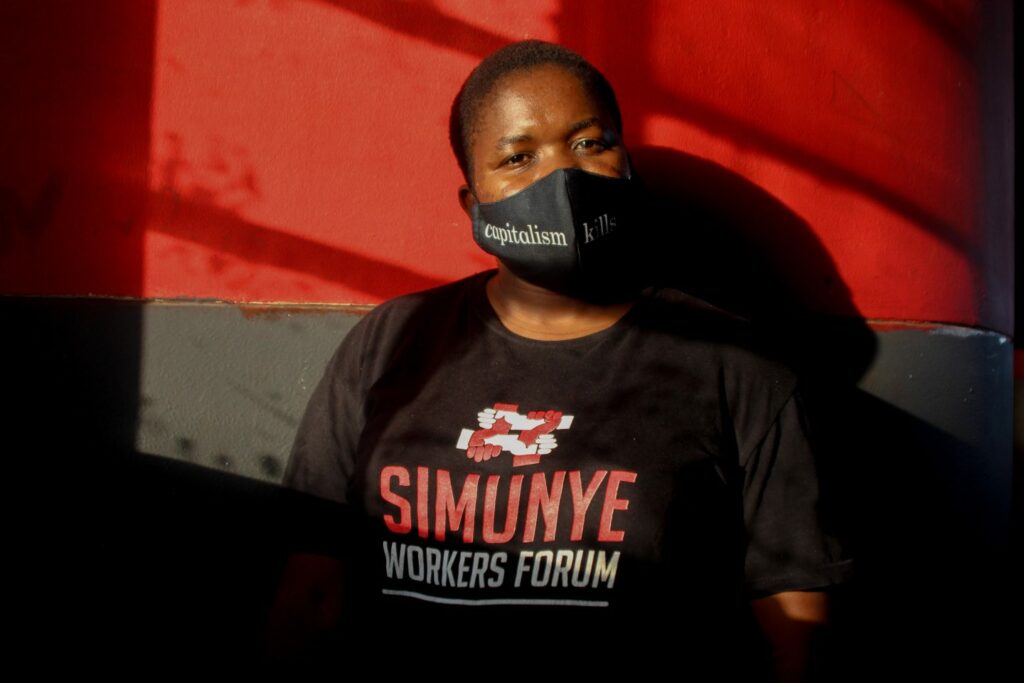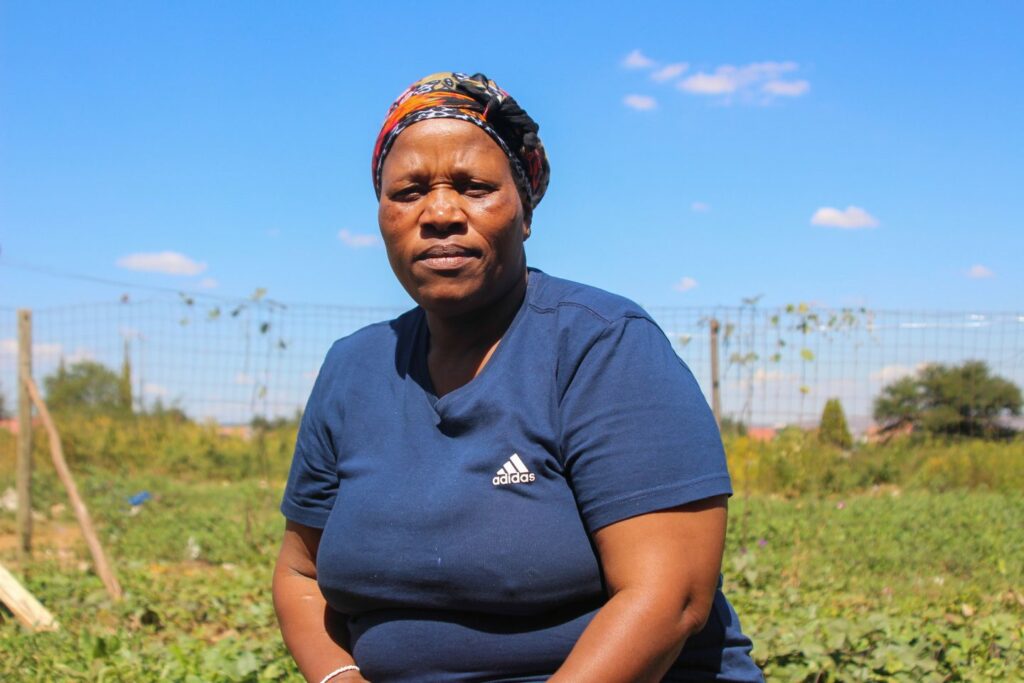(Ashraf Hendricks/Ground Up)
Covid-19 and the dire financial state of the Commission for Conciliation, Mediation and Arbitration (CCMA) have left workers vulnerable to unfair dismissals and con artists who try to exploit them. Because of health safety measures and budget cuts, the CCMA has closed walk-in facilities at its offices and workers say there are also fewer part-time commissioners available to handle their disputes. Some also complain that commissioners do not act in workers’ interest.
This has led to several workers’ forums and organisations launching the so-called Open CCMA Campaign and holding demonstrations outside the organisation’s offices around South Africa. In a joint statement, the campaign said “non-unionised workers occupying the least secure and lowest-paying jobs who depend on the CCMA for their workplace rights will be the most affected”.
It called the decision to cut the CCMA’s funds another “attack on the working class under the pandemic” and said this was happening while “the government offers big businesses billions of rand in relief and security”, adding insult to injury. “Together,” it said, “these moves ultimately serve to open new avenues for private wealth accumulation and deepen capital’s cheap labour regime.”
The CCMA is meant to act as a conciliator and arbitrator in resolving workplace disputes, and also to establish picketing rules during protected strikes and lockouts. But the budget cuts have severely undermined its ability to fulfil these functions and caused a large backlog of cases. Because of the closure of walk-in facilities, workers now have to make online submissions, but many do not have access to the internet and data is expensive.
The secretary general of the Congress of South African Trade Unions (Cosatu), Bheki Ntshalintshali, says the decision to close the CCMA’s doors was “necessitated by Covid-19. [The] CCMA has indicated to us the number of people they’ve lost, and the number of people infected.” Ntshalintshali is one of the CCMA’s board members.
Another board member, National Council of Trade Unions (Nactu) secretary general Narius Moloto, also defended the new way of working. “We’d have been regarded as irresponsible if we see people being infected and dying. As trade unions we have to protect the workers. There may be delays in dealing with cases, but we will make sure that the rights of workers to access CCMA is not taken away. We just changed the way in which cases are being referred.”
Easy pickings
But according to Connie Masekwamenge, a women’s organiser at the Casual Workers Advice Office (CWAO), the move to online referral forms has led to con artists preying on unsuspecting workers, whom they charge between R200 and R900 “to fill in the form and send it”.
“There are also lawyers [who] make people sign that once the case is heard, the lawyers will take 50% of their settlement agreement. These vulnerable workers are conned to sign up for these dubious agreements. These things existed before, but [the closure of walk-in facilities] makes it worse,” she said.
“We are aware that there is Covid-19, but they can still follow the safety procedures. Workers have to pay R5 for a referral form in Johannesburg internet cafés. In Benoni … workers pay R10 for a referral form. There is someone who charges R20 to fill in the form should you not know how to fill it in.”
 Connie Masekwamenge, an organiser at the Casual Workers Advice Office, says the closure of walk-in facilities at the CCMA has led to con artists and unscrupulous lawyers taking advantage of workers. (Photograph by Magnificent Mndebele)
Connie Masekwamenge, an organiser at the Casual Workers Advice Office, says the closure of walk-in facilities at the CCMA has led to con artists and unscrupulous lawyers taking advantage of workers. (Photograph by Magnificent Mndebele)
CWAO education and media officer Lynford Dor says if workers do manage to get past this hurdle and have their matters heard, they face another challenge. “It seems strange to call the CCMA an anti-worker organisation, but that’s how workers experience them. We know that commissioners are incentivised to settle matters. They need to represent themselves as a dispute resolution body that resolves issues amicably. As a result, they settle matters far below what it could potentially yield.”
Mannana Maria Ntjale, 45, from Kroonstad in the Free State, feels betrayed by the CCMA. Ntjale, a worker at a butchery that supplies meat products to Sernick retail outlets, says she was dismissed unfairly and approached the Kroonstad-based Maokeng Advice and Resource Centre to “help take the matter to the CCMA”. During the conciliation process, at which she was presented by a paralegal from the centre, she says the company said it no longer wanted her to work there and offered her money to leave.
Her case was postponed for a second sitting, which she attended alone because the paralegal was not aware of the date. “The commissioner asked how long I’d been working, and he said ‘all these years you’ve been stealing from the company’. The commissioner forced me to sign for a settlement of R250,” said Ntjale, who wants the settlement agreement rescinded.
CCMA letdown
The centre’s managing director, Jerry Kole, 46, says some CCMA commissioners use interpreters to intimidate workers and persuade them to withdraw cases. “The lady of the R250 settlement said they did not explain properly what she had to sign for. It is important to have a name-and-shame campaign. These commissioners must be known. Why would a commissioner drive from Welkom to Kroonstad for a settlement of R250?”
Susan Thatelo, 46, who lives in Seeisoville in Kroonstad, says she feels the CCMA has kept her from getting justice. The mother of two was among four workers who were dismissed from one of the big retail stores in the town in 2020. They lost their case at the CCMA because, Thatelo says, the commissioner denied them the right to use paralegals from Moakeng and act as witnesses for each other.
“Right now, we are out of jobs and with no settlement. The legal representative of the store only offered us a recommendation letter,” she said. “I’d appreciate it if commissioners and interpreters could be considerate and protect the rights of workers instead of companies who take advantage of us. At the end of the case, the commissioner said [the store] played their cards very well. This means that the company was taking advantage of us.”
Portia Matini, 50, who was suspended from her job as a security guard for Compound SBT Security in Soweto in May last year, says she is being sent from pillar to post. Matini sought recourse at the CCMA and the case was heard, after which she was supposed to receive the salary she had lost as a result of her suspension. The company was also ordered to reinstate her on 1 August, but this hasn’t happened. Matini says she has returned to the CCMA for help three times but is always told to come back because there is no part-time commissioner available to assist her. “I am losing hope about this case now.”
The CCMA did not respond to questions but said it would hold a press conference in “due course … to share information concerning its operations and also to respond to any allegations or misconceptions”.
Pain of cost-cutting
According to a CCMA revival strategy document, its allocation from state coffers is “expected to decrease even further due to the shrinking government fiscus” and it “will have to explore other revenue-generating avenues for the sustainability of the organisation”. The budget will be cut by R600-million over the next three years.
Economist Busi Sibeko of the Johannesburg-based Institute for Economic Justice says the government’s austerity measures are detrimental to workers and come at a difficult time for them. “If you look at the cuts that are being made to the CCMA right now and other sectors, there’s obviously a lack of principled approach to what cuts are made. We know that a lot of people are going to lose their jobs, people are being retrenched. It is during a crisis, a pandemic, and job insecurity is on the rise.
“This is a direct attack on labour, on workers. [What the government is saying is] that we are willing to forgo workers’ protection during this period without justification.”
 Portia Matini was suspended from her job as a security guard in May last year. The CCMA ordered that she be reinstated, but it has not happened and she is losing hope that it ever will. (Photograph by Magnificent Mndebele)
Portia Matini was suspended from her job as a security guard in May last year. The CCMA ordered that she be reinstated, but it has not happened and she is losing hope that it ever will. (Photograph by Magnificent Mndebele)
Sibeko also says the budget cuts must not be viewed in isolation. “We must contextualise this within the broader issue of the neoliberal economy, which is not concerned with workers’ wellbeing and workers’ protection. These austerity measures have been progressively coming. They’ve tested us little by little and finally they’ve gone extreme. We have to realise that we are fighting a larger system.”
Ntshalintshali says organised labour has tried to challenge the issue of budget cuts at the CCMA. “We keep raising this issue. We’ve raised it with the ANC and we think it’s unfair. We know that money might not be available, but we don’t think the CCMA should fall under that category of not having money to deliver social justice.”
However, the Maokeng Advice and Resource Centre says unions have not done enough to resist these austerity measures. “Cosatu and other federations, especially those in alliance with the ruling party, is only massaging the ego of the ruling party,” said Kole. “We are saying these people who are vocal in Cosatu and Nactu are absent capitalists. [They] seduce workers with sloganeering. In reality they are hyenas and leopards in lambs’ skins.”
This article was first published by New Frame.